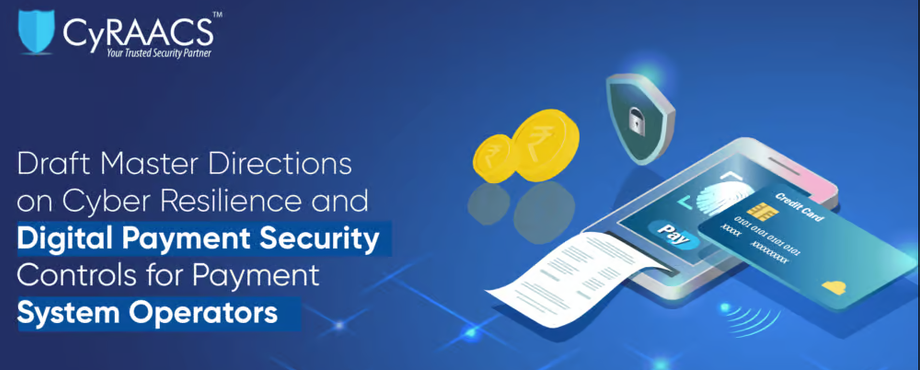India's digital payment ecosystem has witnessed exponential growth in recent years, providing convenience and accessibility to millions of users. However, as the digital landscape expands, so does the need for robust cybersecurity measures. To address this critical aspect, the Reserve Bank of India (RBI) has introduced a draft master direction that covers various domains of cyber resilience and digital payment security. This blog explores the key areas emphasized in the draft and the significance they hold in developing a secure digital payment ecosystem in India.
Applicability:
| Regulated Entity | Entities applicable for | Timeline for implementation |
| Large non-bank PSOs | Clearing Corporation of India Limited (CCIL), National Payments Corporation of India (NPCI), NPCI Bharat Bill Pay Limited, Card Payment Networks, Non-bank ATM Networks, White Label ATM Operators (WLAOs), Large PPI Issuers, Trade Receivables Discounting System (TReDS) Operators, Bharat Bill Payment Operating Units (BBPOUs) and Payment Aggregators (PAs) | 1st April 2024 |
| Medium non-bank PSOs | Cross-border (in-bound) Money Transfer Operators under Money Transfer Service Scheme (MTSS) and Medium PPI Issuers | 1st April 2026 |
| Small non-bank PSOs | Small PPI Issuers and Instant Money Transfer Operators | 1st April 2028 |
The draft directions aim to provide a comprehensive framework for the governance, risk management, security controls, incident response, audit and compliance of the PSOs with respect to cyber resilience and digital payment security. They also specify baseline security measures for ensuring safe and secure digital payment transactions, such as encryption, authentication, access control, monitoring and reporting.
Governance:
To effectively manage information security risks, PSOs must establish a proactive approach at the highest level of governance. The Board of Directors assumes the responsibility of overseeing information security risks, including cyber risk and cyber resilience. A board-approved Information Security (IS) policy should be formulated, covering all applications and products related to payment systems. This policy will serve as a roadmap for managing potential risks and addressing any materialized threats.
Risk Management:
PSOs need to develop a robust risk management framework to identify, assess, monitor, and manage cybersecurity risks. Periodic risk assessments should be conducted to identify the sources and magnitude of cyber threats and vulnerabilities. These assessments will enable PSOs to implement appropriate risk mitigation measures, thereby reducing the potential impact of security incidents.
Security Controls:
Implementing adequate security controls is crucial for protecting the confidentiality, integrity, and availability of information assets and payment systems. PSOs must establish a comprehensive set of security controls covering various aspects, such as physical security, network security, application security, data security, endpoint security, cloud security, cryptography, identity and access management, malware protection, patch management, backup and recovery. These controls work in tandem to create multiple layers of defense against potential threats.
Incident Response:
PSOs should establish an effective incident response mechanism to detect, contain, analyze, respond to, and recover from cyber incidents. Swift detection and containment of incidents can help minimize their impact. PSOs must also adhere to prescribed timelines and formats to report cyber incidents to regulatory authorities, such as the RBI. Conducting thorough root cause analysis enables PSOs to identify vulnerabilities and implement corrective and preventive measures to prevent similar incidents in the future.
Audit:
Regular internal and external audits are essential to assess the adequacy and effectiveness of a PSO's cyber resilience and digital payment security framework. Audits should encompass all aspects of the framework, including policies, procedures, processes, systems, controls, and compliance. The findings and recommendations from these audits serve as valuable inputs for the Board and senior management to take necessary actions and strengthen the security posture further.
Compliance:
Adhering to applicable laws, regulations, standards, and guidelines is a fundamental aspect of cyber resilience and digital payment security. PSOs must ensure compliance and proactively monitor changes in the regulatory landscape. Regular updates to the framework based on evolving requirements will help maintain a robust security posture. PSOs should submit periodic compliance reports to regulatory authorities, such as the RBI, as per the prescribed frequency and format.
RBI aims to mitigate cyber risks and promote a culture of cyber resilience among PSOs. Implementing these measures will help safeguard customer data, prevent cyber incidents, and foster trust in digital payment systems, contributing to the nation's digital transformation journey.
Establishing a strong cybersecurity framework is imperative for Payment System Operators to ensure cyber resilience and protect digital payment systems. By implementing effective governance, robust risk management practices, comprehensive security controls, efficient incident response mechanisms, thorough audits, and strict compliance measures, PSOs can mitigate risks and enhance the security of payment systems. This comprehensive approach strengthens the trust of customers and stakeholders in the digital payment ecosystem, paving the way for secure and seamless transactions in the digital era.
Please reach out to us to know more about this at mailus@cyraacs.com
Source: https://cyraacs.com/draft-master-directions-on-cyber-resilience-and-digital-payment-security-controls-for-payment-system-operators/

